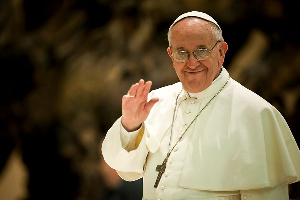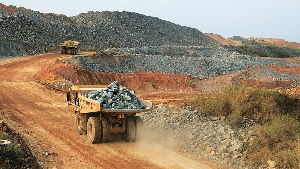Excellent analysis of the problem in the comment section
Ghana and the IMF
Time for thrift
A mounting deficit forces Ghana to ask for help
·
SPECTATORS of the euro crisis have learned to look for a few defining precursors when trying to decide which peripheral European country was next in line for a bail-out. These usually include slow economic growth, high indebtedness (either private or public) and a wobbly banking system. They may have to tear up those rules when looking at Ghana , which on August 4th asked the IMF for help after its currency, the cedi, fell by a third against the dollar since the start of the year.
Until recently Ghana was something of a model for good governance inAfrica, so its fall from grace is a shock. It enjoyed a run of economic growth averaging about 6% a year, and although that moderated to 4.4% last year, growth of 6-9% is expected in the next few years. Private-sector debt remains low and Ghana started this decade with public borrowing of below 40% of GDP. Such seemingly sound fundamentals meant its debut bond issue in 2007 was a huge hit among foreign investors.
been living beyond its means. Public debt is rising rapidly and now tops 50% of GDP on official figures. Fitch, a ratings agency, puts it even higher at 62%, taking into account a revaluation of its foreign-denominated debt. The main cause is a yawning fiscal deficit, which stood at 10.1% in 2013 and is forecast by Fitch to remain above 8% in each of the next two years.
Ghana’s deficit is in turn mainly the result of big rises in public-sector pay. In 2012 civil servants’ wages gobbled up 70% of government revenues, which have also been squeezed by falling commodity prices. The government hopes to cut that to 35% in three years.
Meanwhile, the administration of John Dramani Mahama, the president, has changed tack on fuel subsidies—they were cut, then quietly reinstated—and has been unable to prevent tax collection falling short of expectations. A weakening global gold price has also sapped Ghana of a vital source of foreign exchange. The country had a current-account deficit of 12.3% of GDP last year.
The IMF will probably demand a cap on borrowing, a public-sector pay freeze, a more consistent policy on subsidies and perhaps some privatisation of power and water companies. None of this will be popular. Having spent too freely for a few years, Ghana looks set to experience a bit of European-style belt-tightening.
From the print edition: Finance and economics
Until persons in authority identify their missions in various positions that thy are assigned to; and are expected to function with due diligence, employing duty of care this chaotic mismanagement of economy will never go away.
Secondly, it's with profound sadness that the academic intelligence and experiences that most these leaders have acquired domestically and. in the Diaspora before taking such offices brings shame to them and need to vacate such offices due to their incompetencies .
Ghana needs men and women who have the Country and its citizens at heart not selfish unscrupulous leaders. Leaders start thinking big and at least learn from successful leaders.
We in the Diaspora are dismay with your actions.
Stop take a stock of your actions and see how much you have wronged your fellow citizens.
· Recommend
0
· Report
· Permalink
· Reply
p-kan Aug 9th, 19:44
Except for politically corrupt officials everyone else in Ghana knows the cause of our problem is due to incompetent leadership and corruption. The Economist has been lenient on this article and I am highly disappointed.
· Recommend
1
· Report
· Permalink
· Reply
notadoboli Aug 9th, 18:37
I am afraid this article falls short of the high standards I associate with The Economist.
It pretends that the Ghana fiscal deficit is mainly the result of wage-pull expenditure increases. That is partly true, but it is only part of the story. The main cause is shocking profligate spending by the Mahama Government.
First in this regard is the sheer size of his Government. At least 70 Ministers and deputy Ministers man an administration also bloated with an enormous amount of para-state organisations. Many of these could be merged without loss to efficiency, as they do practically nothing and exist mainly to give "jobs for the boys"" of the ruling NDC.
Their opulent lifestyles -- marked by free cars and partly-free fuel and expensively-subsidised housing, amazes a populace which is being asked to "tighten its belt" in order to pay more for petrol, electricity, water and such public transport as exists.
But worse is waste that is driven by undisguised corruption. Organisations with hard-to-decipher acronyms, and even more difficult to determine functions, such as GYEEDA, SADA etc., have gobbled up billions of Cedis. Did The Economist Correspondent read The Ghana Auditor-General's Reports before writing his piece? Has he heard of the phenomenon of "judgement debts"by which millions of Cedis are given to NDC patrons like Alfred Woyome, on the basis of court cases against the Government which the Government lawyers in the Attorne-General's Department deliberately refuse to defend competently but rather choose to "settle" out of court -- with damages ägreed and entered as "judgement debts" that MUST be paid? The Supreme Court has just ordered the refund of 51 million Cedis p[aid to the aforementioned Woyome. Mahama has refused to prosecute the government lawyers whose negligence and/or corruption caused the amount to be paid in the first place.
I expect The Economist to be fully aware of these things, instead of rehashing the old bogeys -- subsidies and gold/cocoa price declines. Who does not know that the prices of raw material exports fluctuate on the world market? How often, in the past, has Ghana not suffered such price decreases and why did Mahama's budget(s) not make allowance for the possibility of such price fluctuations?
The IMF will be making a huge mistake if it does not discipline Mahama in relation to frivolous spending and corrupt granting of funds to politically-motivated establishments entities like GYEEDA.
The IMF lacks credibility in Ghana, due to the sadistic policies it inflicted on Ghanaians during the Jerry Rawlings regime (especially in 1983-1992) If it wants to salvage its reputation, it should read the Auditor-General's Reports, wield the big axe against corruption, and then go about balancing the budget, Otherwise it will be seen as propping up corruption and inefficiency, once again, in a Third World country managed by kleptocrats who have no clue on how to run a modern economy.
Opinions of Wednesday, 13 August 2014
Columnist: Addo, Kofi














